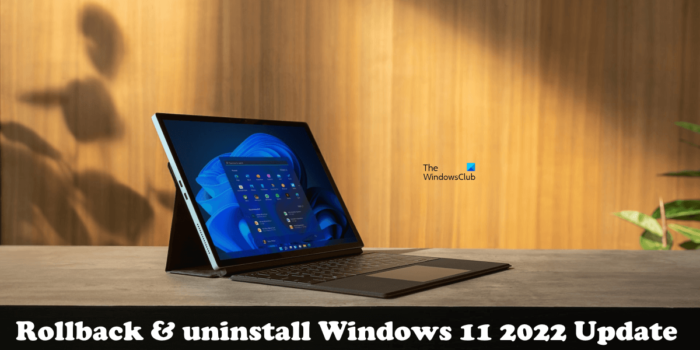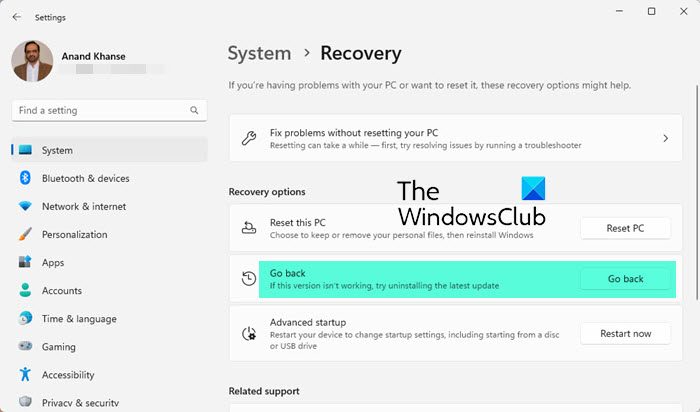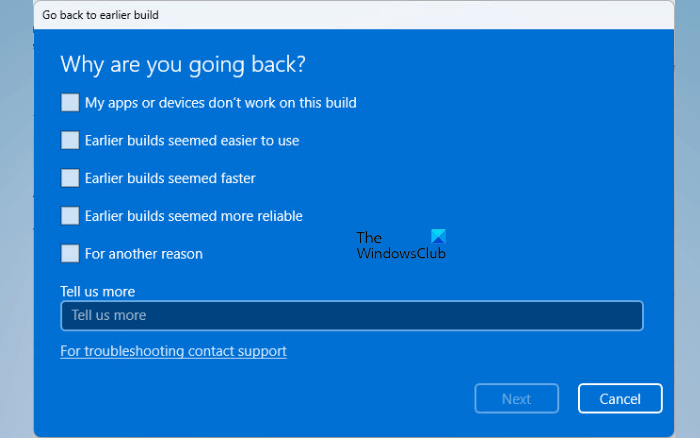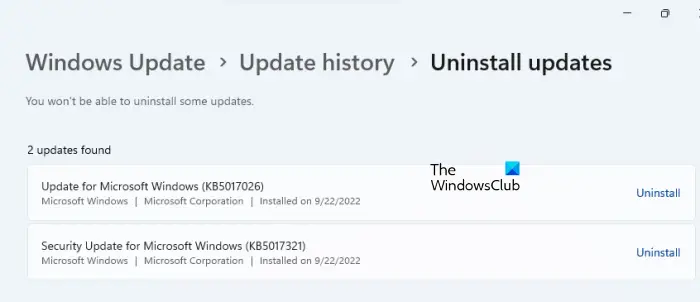Microsoft has released the first Feature Update for Windows 11. This update is called Windows 11 24H2 or Windows 11 version 24H2. If you have installed this update and for some reason, you want to go back to the previous Windows build, you have to roll back or uninstall Windows 11 24H2 Update. In this article, we will show you how to rollback, uninstall or downgrade Windows 11 24H2.

How to rollback or downgrade Windows 11 24H2 Update
If you are facing issues after installing Windows 24H2 Update or you want to stay in the same version for a little longer, you can go back to the previous version of Windows 11. The following steps will guide you on how to rollback and uninstall Windows 11 24H2 Update.
- Open Windows 11 Settings.
- Go to System > Recovery.
- Click Go back.
- Explain what you want to go back to the previous version
- Click Next and wait for the roll back to complete.
Let’s see all these steps in detail.

Open Windows 11 Settings and go to “System > Recovery.” On the Recovery page, click Go back under the Recovery options.

As you click Go back, a new window will open asking you the reason for going back to the previous build of Windows. If you are experiencing issues with Windows 11 24H2 Update, like your apps are not working or you think that the earlier build was easier to use or faster than Windows 11 24H2 build, you can select the desired option. Otherwise, select the “For other reason” option. After that, click Next.
On the next screen, Windows will ask you to check for updates once again so that if an update is available, you can install it to fix the issues you are currently facing. On this screen, click No, thanks.
If you have changed your password, make sure that you remember your old password too. Otherwise, you may lock out of your computer. Click Next and then click Go back to earlier build. After that, Windows will start rolling back to the earlier build. This process will take time. Do not interrupt this process or power off your computer while the Windows update is rolling back.
Go back option is missing or greyed out on Windows 11
If the Go back option is missing or greyed out on your computer, there is one more way to uninstall Windows 11 24H2 update. The following instructions will help you uninstall the Windows 11 2024 Update.

- Open Windows 11 Settings.
- Go to “Windows Update > Update history.”
- Scroll down and click Uninstall updates under the Related settings section.
- Select the update that you want to uninstall and click Uninstall.
If you have clean installed Windows 11 24H2 Update, you will not find it in Update history.
I hope this helps.
TIP: If the Windows.old folder still exists on your device then you can roll back Windows 11 after 10 days limit by editing the Registry or using a PowerShell command.
How do I uninstall Windows 11 update?
You can uninstall Windows 11 update on the Update history page in Windows 11 Settings. Open Windows 11 Settings and go to “Windows Update > Update history > Uninstall updates.” Now, select the update that you want to uninstall and select Uninstall.
How do I go back to Windows 11 23H2?
Windows 11 has an option that lets you go back to the previous builds. If you want to go back to Windows 11 23H2, open Windows 11 Settings and go to “System > Recovery.” Now, click Go back and follow the on-screen instructions to go back to Windows 11 23H2. We have explained a step-by-step process to roll back & uninstall Windows 11 24H2 Update above in this article.
Bonus Tip: Learn how to extend the time period to uninstall a Windows Upgrade.
How do I uninstall and reinstall Windows 11?
If you uninstall Windows 11, all your data on the C drive will be lost. To uninstall and reinstall Windows 11, first, download the Windows 11 ISO from Microsoft’s official website. Now, copy that ISO file into a Pen Drive and make that Pen Drive bootable by using third-party software, like Rufus. Alternatively, you can create Windows 11 bootable installation media using Media Creation Tool. Now, clean install Windows 11 from that Pen Drive.
Read next: Windows 11 24H2 Update Version not installing.
Leave a Reply